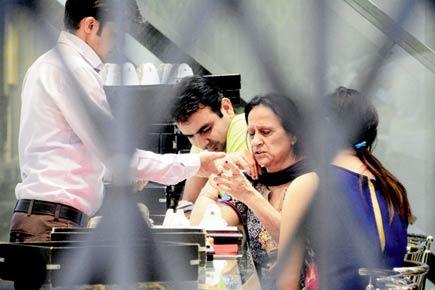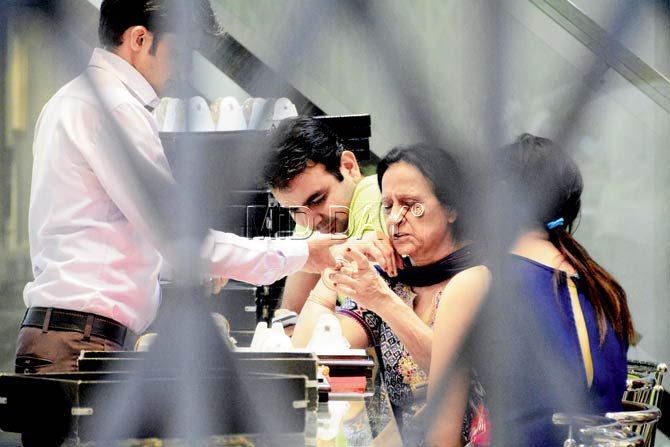Gold is money. It has always been money. Nobody knows this better than us Indians

 A customer doesn’t look too pleased while trading cash for gold bangles at 1 am yesterday inside a shuttered jewellery store in Ghatkopar. Pic/Bipin Kokate
A customer doesn’t look too pleased while trading cash for gold bangles at 1 am yesterday inside a shuttered jewellery store in Ghatkopar. Pic/Bipin Kokate
ADVERTISEMENT
 Gold is money. It has always been money. Nobody knows this better than us Indians. Our love for the yellow metal comes out in the way we hoard it. And this faith in gold was at display all night long yesterday in Mumbai.
Gold is money. It has always been money. Nobody knows this better than us Indians. Our love for the yellow metal comes out in the way we hoard it. And this faith in gold was at display all night long yesterday in Mumbai.
The question is what brought out Mumbaikars to buy gold on a non-festive day? The answer is Narendra Modi. In a late evening TV address to the nation, Prime Minister Modi banned the use of Rs 500 and Rs 1,000 as legal tender. This essentially made a little more than 86 per cent of notes practically useless overnight.
Anyone who has Rs 500 and Rs 1,000 notes can deposit them in his or her bank account or post office account, until December 30, 2016. This money will be credited into the bank or post office account. Nevertheless, these notes can be exchanged only up to a total of Rs 4,000 as cash. This limit has been set for a period of 15 days and it will be reviewed after that.
People who have always declared their income and paid taxes on time, have nothing to worry about. All they need to do is go to a bank or post office and deposit the Rs 500 and Rs 1000 notes they have. The money will be credited into their accounts, which they can later withdraw through ATMs/ cheque.
Nevertheless, this move of the Modi government has created trouble for those who have black money in the form of cash or notes. Black money is essentially unaccounted money which has been earned but on which tax has not been paid. If the holders of black money were to deposit it in their bank account, it would probably lead to questions from the income tax department regarding the origin of the money.
If they were to continue to keep it under their mattresses, the money would become useless overnight. Hence, the next best thing to do was to convert that money into a physical asset, which would continue to hold value. Of course, physical assets like land or flats or paintings cannot be bought overnight. But there is no such problem in buying gold. It is practically available everywhere in the city. All one needs to do is to step out and buy it. And this is precisely what Mumbaikars who had black money in the form of cash did late last night.
They exchanged their Rs 500 and Rs 1,000 notes for gold and ensured that their black money continued to hold value. That no identification documents need to be shown for gold purchases of up to Rs 2 lakh, makes converting black money into gold an easy proposition. Further, those with black money always have the option of buying gold from multiple jewellers in order to avoid showing identification documents. Hence, people were busy converting their black money into gold.
As per the government notification, Rs 500 and Rs 1,000 were not supposed to be a legal tender post-midnight. But the city jewellers seemed to have overlooked this technicality and carried on with brisk business (as the news report tells us). This was a good opportunity for them to earn some money, in what has been an otherwise slow year. Of course, the money that they earned during the night and all the Rs 500 and Rs 1,000 notes that they managed to accumulate, must be deposited into their bank accounts, to make sure that it continues to hold value. If they don’t, they will essentially end up holding worthless pieces of paper.
And once the money is deposited into a bank account, it will essentially mean that the black money of Mumbaikars has been converted into white money of the jewellers on which an income tax will have to be paid. This in a rather circuitous way will be a good thing to happen.
(The writer is the author of the Easy Money trilogy. Reach him at vivek.kaul@gmail.com)
 Subscribe today by clicking the link and stay updated with the latest news!" Click here!
Subscribe today by clicking the link and stay updated with the latest news!" Click here!






